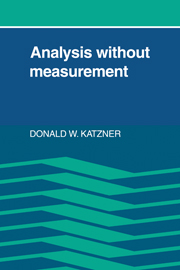Book contents
- Frontmatter
- Contents
- Preface
- Dedication
- 1 Introduction
- 2 Notes on measurement
- Part I Theoretical methods
- Part II Applications to theoretical problems
- Prologue
- 8 Political systems
- 9 Planning
- 10 Simultaneous change and modernization
- 11 Profits, optimality, and the social division of labor in the firm
- Part III Empirical verification
- Index
- Frontmatter
- Contents
- Preface
- Dedication
- 1 Introduction
- 2 Notes on measurement
- Part I Theoretical methods
- Part II Applications to theoretical problems
- Prologue
- 8 Political systems
- 9 Planning
- 10 Simultaneous change and modernization
- 11 Profits, optimality, and the social division of labor in the firm
- Part III Empirical verification
- Index
Summary
Planning, as defined by Ozbekhan, is an activity designed to operate on the present environment for the purpose of changing it into a more desirable state. Individual values determine which states are preferable. Given a particular environment and the configuration of values perpetuating it, fundamental change (i.e., that which creates a distinct future as opposed to an extension of the present) is introduced only through alterations of values. The latter can be varied by individuals alone. If and when specific value changes become socialized and widely accepted, movement from the original state to that implied by the new values is thought of as “progress.” Stated in these terms, planning is the “organization of progress.”
Ozbekhan also conceives of planning as a system that interacts in relation to another system – the environment. The environmental system takes the output of the planning operation as one of many inputs and produces environmental states. The latter also serve as inputs for planning. In this context the “planning system” is a relation as defined in Chapter 6. It may be considered in a static or dynamic framework and is capable of exhibiting various forms of causality, control, and feedback mechanisms. Ozbekhan endows it with a three-level structure: at the highest level, norms and guidelines are sought and general policy decisions are made; on the middle tier, specific goals are set and strategies devised; at the lowest level, decisions taken on the higher two are made operational and implemented. An example of such a system, in which it is assumed that inputs from the environment enter at each level, is diagrammed in Figure 9–1.
- Type
- Chapter
- Information
- Analysis Without Measurement , pp. 171 - 184Publisher: Cambridge University PressPrint publication year: 1983



